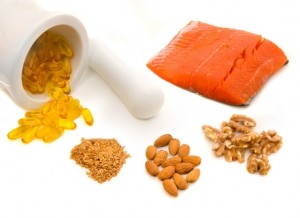The essential fatty acids
The higher the saturated fat content of a fat or oil means it becomes solid at a lower temperature. All fats will turn liquid as the temperature rises. All oils turn solid as temperature drops. The temperature at which this occurs depends on the ratio of saturated fatty acids to unsaturated fatty acids. 
The essential fatty acids go rancid (oxidize) quite easily, particularly linoleic acid and alpha-linolenic acid, so must be treated with care. Polyunsaturated oils oxidize when subjected to heat, oxygen and moisture from cooking or processing. Rancid oils are characterized by free radicals — single atoms or clusters with an unpaired electron in an outer orbit — that cause many health problems. They are associated with premature aging, autoimmune diseases such as arthritis, Parkinson’s disease, Lou Gehrig’s disease, Alzheimer’s and cataracts. With extreme chemical reactivity, they attack cell membranes and red blood cells, damage DNA/RNA strands and trigger mutations in tissue, blood vessels and skin. Free radical damage to the skin causes wrinkles and premature aging, where as free radical damage to tissues and organs sets the stage for tumors. Since most fats and oils contain polyunsaturated oils, they should never be heated or used in cooking. Commercially sold oils that are high in rancid polyunsaturated fatty acids include the common vegetable oils.
Avoid these oils, as most of them are highly processed:
Canola Oil
Soybean Oil
Corn Oil
Safflower Oil
Cottonseed Oil
Crapeseed Oil
Sunflower Oil
Organic, extra-virgin and cold-pressed olive oil is safe to consume, for it has not been exposed to the harsh conditions of refining. The term “extra-virgin” indicates it is unrefined and “cold-pressed” indicates heat was not used during the extraction process. Choose those that are packaged in dark bottles, since exposure to sunlight can cause the polyunsaturated fatty acids portion of olive oil to oxidize.
When selecting oils for cooking, select those with a higher proportion of saturated fatty acids, which are stable at higher temperatures and will not go rancid as easily as polyunsaturated fatty acids. Coconut oil, butter, ghee, tallow and lard are preferred choices for cooking because of their high saturated fatty acid content. Always choose raw and organic versions of these oils.
Avoid heating fats and oils whenever possible, since raw fats and oils contain many nutrients that are heat-labile. The fats found in raw soybeans, raw cream and raw butter contain nutrients — such as the Wulzen or “anti-stiffness” factor — that help lubricate the joints and support liver function. These nutrients protect against calcification of the joints, essentially preventing degenerative joint conditions such as arthritis. They also protect the arteries, eyes and pineal gland, lubricates joints, skin, eyes and areas of muscle aches and cramps. These benefits are destroyed by pasteurization (over heating) and homogenization (excess blending) of milk.